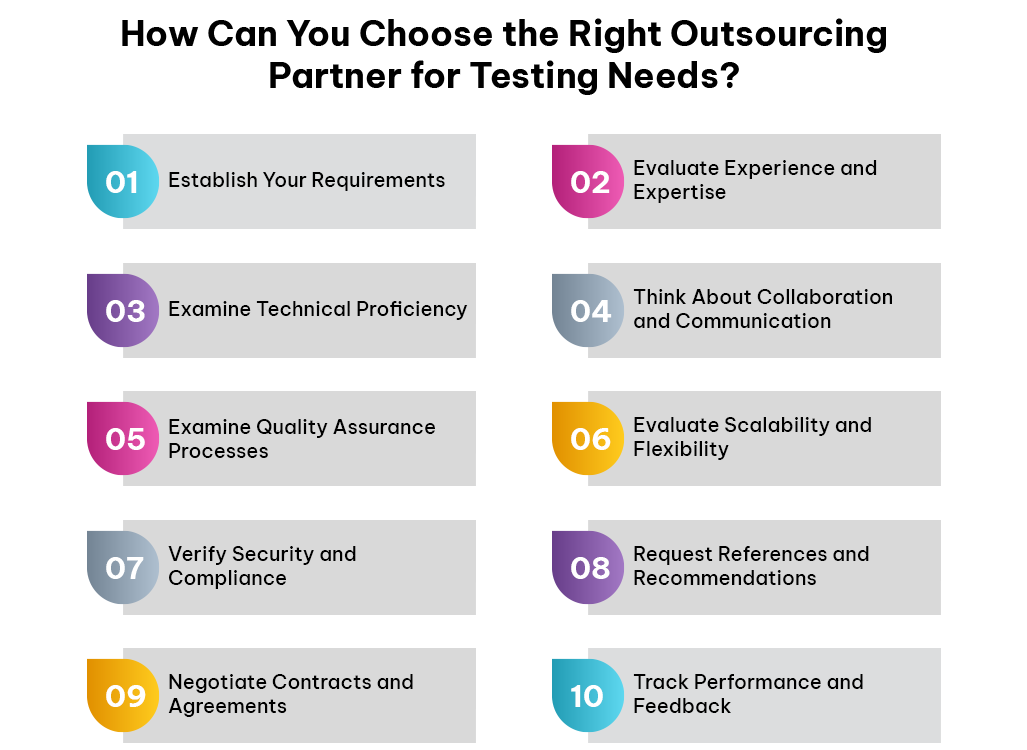
Software testing is a life-and-death issue for companies that want to earn a competitive edge and present a flawless customer experience. Recent technology trends, especially with the rise of Test Automation Services, have increased the global market for outsourced software testing. Let us delve into the world's subtleties that affect the market and how the leading software testing companies can leverage them.
Table of Contents
- Why Quality Assurance is Essential in Software Development?
- Global Trends Reshaping the Outsourced Software Testing Market
- How Can You Choose the Right Outsourcing Partner for Testing Needs?
- Conclusion
- People Also Ask
Why Quality Assurance is Essential in Software Development?
- Finding and Preventing Bugs
Software application faults and bugs are mostly preventable with quality assurance. QA teams may prevent expensive rework and ensure a better user experience by identifying problems early in the development cycle through testing and validation procedures.
- Ensuring User Satisfaction
The reputation of software products should always be good, and the satisfaction of users is largely due to quality assurance activities. Quality assurance teams test software for usability, functionality, and performance to confirm whether or not the software has features needed by an end user for smooth usage during a stressful time.
- Regulatory Criteria and Compliance
Many firms require regulatory compliance software products. By ensuring that software conforms to industry-specific regulations and guidelines, quality assurance minimizes the chance of non-compliance and any consequent legal issues for the company.
- Improving Credibility and Brand Reputation
Improving credibility and brand reputation is mostly dependent on quality assurance. Businesses may gain the trust of their clients and establish themselves as trustworthy suppliers by producing high-quality software solutions that are error- and defect-free.
- Cost Savings
Clearly defining terms and responsibilities helps to solve problems early in the development process, thus protecting the business interests. QA can eventually save time and resources for the company by lessening the cost of reworks and post-release support through early detection of issues and defects.
- Increasing Productivity and Efficiency
The productivity and efficiency of software development teams can be seen visibly augmented by the application of sound quality assurance technologies. Testing teams can reduce the effort needed in testing, expedite finding the problem, and create more time for developers to concentrate on the delivery of newer features and functions through putting automated testing tools and techniques into action.
- Risk Mitigation
Quality assurance is one way an organization can lessen the threat associated with software development projects. By early identification of potential threats and vulnerabilities, testing teams can reduce the risk of project delays, breaches of security, and other adverse effects. Thorough risk assessments and effective mitigation techniques would help achieve this.
- Continuous Improvement
It's true that quality assurance plays a role in software development teams toward an ongoing quest for improvement of their product. QA teams would ensure the betterment of the subsequent software releases by doing the assessment and evaluation of test operation feedback to identify areas for improvement and remedial measures.
Global Trends Reshaping the Outsourced Software Testing Market
1. Increasing Adoption of Agile and DevOps Practices
Agile and DevOps approaches that stress teamwork, flexibility, and continuous delivery have entirely transformed the software development lifecycle. With Agile and DevOps on the rise to accelerate and bring their development processes into focus, the demand for software testing services has surged. Outsourcing testing service providers serve as pivotal members of Agile and DevOps teams with on-demand testing services, automation tools, and feedback in real-time.
2. Growing Test Automation Importance
Rapid software development has far outpaced the effectiveness of manual testing services for modern application expectations. Testing automation has become a key enabler in getting better test coverage and time to market for higher-quality software. Under this trend, the outsourcing companies are investing heavily in automation tools, frameworks, and expertise that help clients have greater efficiency in their testing processes.
3. The Left-Shift Testing Method
In the shift-left testing concept, testing should begin at the requirements phase with an emphasis on early testing in the software development lifecycle. Knowing the defects early and solving them helps the organization to cut costs, reduce rework, and speed up time-to-market. By adopting the shift-left methodology to help an organization achieve better software products by assessing requirements, discovering defects early, and conducting risk assessments, the outsourcing testing service vendors are providing these services to the clients.
4. Testing Employing AI and Machine Learning
New technology, such as artificial intelligence or machine learning, has been encouraging the current revolution in software testing. These technologies give organizations the power to detect faults, automate repetitive tasks, and extend test coverage. AI and ML are currently being applied to the outsourced testing services that are taking test automation further by producing intelligent test cases and analyzing huge amounts of test data to discern trends and anomalies. However, organizations that opt for testing by AI can reap results in terms of on-time, accurate, and cost-effective evaluations.
5. Focus on Security and Compliance Testing
Advancements in the number and sophistication of attacks raise increasing concerns over internal security testing for all organizations. Some extensive security testing, vulnerability assessment, and compliance audit services are added alongside outsourced testing by such companies to help secure apps and data from potential attacks and breaches. Such organizations may also reduce risks, maintain regulatory compliance, and protect their brands by giving priority to security and compliance testing.
6. Embracing Cloud-based Testing Solutions
Increasingly the use of cloud computing, businesses are revolutionizing the way they create, implement, and test software. Testing may escalate in requirements for flexibility and cost efficiency; cloud-based testing enables businesses to scale their operational QA efforts while establishing virtualized environments without enormous infrastructure capital investments. To better cater to the changing needs of customers, outsourcing QA offers cloud technologies in service offerings such as on-demand testing, performance testing in scalable cloud environments, and testing as a service (TaaS) model.
How Can You Choose the Right Outsourcing Partner for Testing Needs?

For your project to be successful, selecting the best outsourcing partner for your testing requirements is essential. To assist you in choosing wisely, consider the following steps:
- Establish Your Requirements
Document precisely what kind of testing it would entail; the coverage of the whole project, timelines for completion, and the amount available to spend. When you have a clear idea of what you need, it is relatively easy to source the most suitable outsourcing partner for this requirement.
- Evaluate Experience and Expertise
Seek partners with outsourcing who have relevant experience and expertise in your sector and the testing kinds needed. Examine their case studies, portfolio, and client endorsements to determine their experience and qualifications.
- Examine Technical Proficiency
Whenever possible, assess the technical competence of the outsourcing team, including knowledge of testing tools, techniques, and technologies. This includes the necessary know-how and experience to complete a given task successfully.
- Think About Collaboration and Communication
Outsourcing success partnership is built mostly on collaboration and communication. It would be a worthy partner who will respond quickly, keep an open communication channel, and work very closely with your team.
- Examine Quality Assurance Processes
Confirm that the quality assurance processes and methodologies of an outsourcing partner comply with industry standards and best practices. Engage partners with established testing processes and a strong emphasis on quality.
- Evaluate Scalability and Flexibility
Flexibility, infrastructure, and scalability of outsourced resource personnel should be evaluated. Prepare for rallying the troops or demobilizing; there should be a contingency plan if the outsourced personnel are to be scaled up or down, depending on the needs of the project and deadlines.
- Verify Security and Compliance
When outsourcing testing services, security and compliance are the most important. The outsourced partner should comply with all applicable laws for the confidentiality of data and also have well-defined security measures in place.
- Request References and Recommendations
Testimonial collection may involve recommendations from past clients or colleagues from the same industry with whom the outsourced associate worked. Such personal testimonials might throw some light on the priority advantages and disadvantages of your partner.
- Negotiate Contracts and Agreements
When you have finally selected an outsourcing partner, the Contracts and Agreements should be entered into for the precise specification of deliverables of the project, deadlines, roles, and terms of engagement. To eliminate misunderstandings later, ensure that every party knows what is expected of him or her.
- Track Performance and Feedback
Throughout the project, keep an eye on your outsourcing partner's performance. Give constructive criticism and quickly resolve any problems or concerns to guarantee that the collaboration stays fruitful and profitable.
Conclusion
The software testing industry means characteristically fast changes today with worldwide trends of Agile and DevOps adoption, growing importance of test automation services, and the passing days with a high tide of AI and machine-learning technologies. Any enterprises conforming to these trends and associating themselves with a well-known Software Testing Company or outsourced testing service providers would be able to build more scalable and advanced software solutions that meet the requirements posed by the present digital economy, creating a competitive positioning. By tracking these global trends and smartly using outsourced testing services, businesses may properly navigate the complex testing landscape and really thrive in their digital transformation journey.
People Also Ask
1. Which major global trends are influencing the market for software testing that is outsourced?
Several major worldwide trends that shape the market for outsourced software testing are the increasing adoption of DevOps and Agile practices, test automation being critical, left shift testing methodology, AI and ML usage in testing, security and compliance testing, and cloud testing solutions.
2. What effect do DevOps and Agile methodologies have on the market for contracted software testing?
The emphasis on teamwork, adaptability, and continuous delivery in agile and DevOps approaches is fueling the need for external software testing services. Testing companies help Agile and DevOps teams by providing real-time feedback loops, automation solutions, and on-demand testing services to speed up development and guarantee the delivery of high-quality software.
3. In the market for software testing that is outsourced, what function does test automation serve?
Test automation is important for better coverage of tests, quicker time to market, and better quality software. Outsourcing test providers are investing in the capabilities, frameworks, and tools for automation to allow clients to reach a new potential of greater efficiency and effectiveness in their testing efforts, reducing manual efforts and supporting shorter release cycles.
4. How is software testing changing as a result of AI and machine learning technologies?
With the assistance of AI and machine learning techniques, organizations will be able to discover problems, optimize test coverage, and reduce repetitive operations. Such service providers effectively employ AI-driven testing solutions to enhance test automation and generate intelligent test cases, analyze vast amounts of test data to find trends and anomalies. These lead to faster, more accurate, and cheaper test results.
5. Why should I use cloud-based testing solutions? What are the advantages?
Cloud Testing Solutions allow affordability and flexibility in testing operations within virtualized environments without any sizable investments in infrastructure. Outsourcing testing service providers exploit cloud technologies to provide on-demand services, Performance Testing Services in scalable cloud environments, and Testing as a Service (TaaS) model to accommodate their clients' fluctuating requirements.

